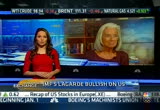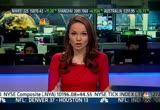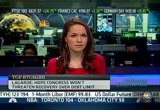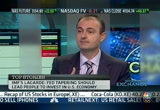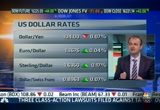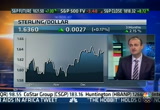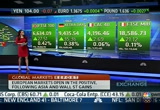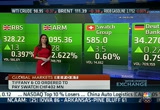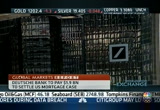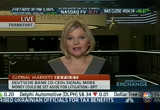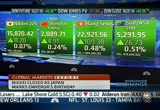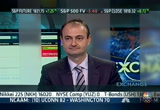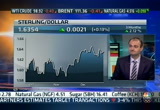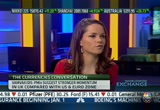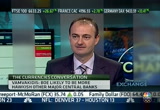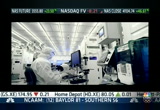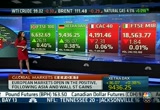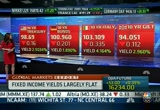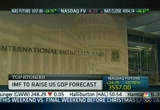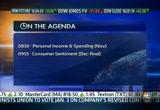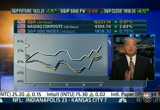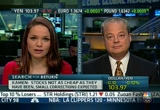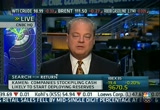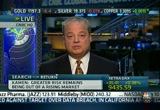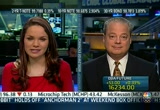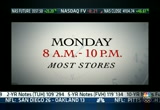tv Worldwide Exchange CNBC December 23, 2013 4:00am-6:01am EST
4:00 am
welcome to "worldwide exchange." i'm carolyn robin and these are your headlines from around the world. the chinese banking system under pressure as interbank lending rates spike. asian equity markets largely shrug off fierce of a credit crunch. the imf is striking a bull i shall tone on the u.s. economy. >> we see the fed having taken some very well communicated action concerning the tapering
4:01 am
of a program and those are good signs. in addition to which we see some good numbers. $1.9 billion and counting. the co-ceo of deutsche bank signals they may have to set aside more money for litigation as they settle u.s. mortgage claims. after years of talking, apple clinches a deal with china mobile to sell iphones. it could increase their revenues by $10 billion. >> announcer: you're watching "worldwide exchange" bringing you business news from around the globe. hello, everyone. it's almost christmas and ross westgate has already started his christmas vacation so that's great for him. i'm filling in for him this week. let's get back to one of our top stories. the imf is raising its forecast for u.s.gdp citing the budget
4:02 am
talks to taper bond buying program. in october the imf said gdp was expected to expand 2.5% next year. while she didn't offer a new number, imf manager christine will he guard appearing on nbc's "meet the press" says she sees a lot more certainty for 2014. >> most people who invest, who hire will tell you that they're uncertain. they were uncertain because seeing a budget deal, seeing tapering by the fed, which is a sign of confidence in the real economy, should lead them to invest, to hire, and to be more confident into the future of the u.s.e -- >> how -- >> will . will he guard says she hopes she won't threaten the economy with, quote, another debate on whether the u.s. la offer
4:03 am
another deal. we're joined for the full hour. thank you so much for coming in this morning. how are you? >> very well. >> fantastic. >> waiting for the holidays. >> same here. same here. couple days away. let's talk about the u.s. because we've seen the imf upgrading its forecast for the u.s. we don't know by how much. in october they said they see the u.s. growing in 2014 by 2.5%. do you think what christine lagarde alluded to will have the same shocking effect on the markets? >> it is a risk, but i'm not very concerned. actually, the u.s. story has been extremely interesting. we started the year with a u.s. economy that was relatively weak despite the substantial stimulus by the fed. we're concerned about the fiscal cliff. we avoided the fiscal cliff. we had the sequester and then
4:04 am
the government shutdown. despite the uncertainty, the euro's numbers are getting better and better. we don't expect such a risk next year because the political cost of the government shutdown was substantial. most likely we're going to get some help. looking forward we are bullish. >> what does it mean for the u.s. dollar? we've seen some strength after the tapering last week but it seems as though the dollar rally that everyone is expecting hasn't really kicked off. it's not making a lot of head way against the euro or the pound. it is higher against the yen but that's all related to abenomics. when do you expect that? >> when we look at the data this year, that will suggest a much stronger dollar. it's a very loose monetary policy by the fed which to a large extent was trying to off set the tight fiscal policy.
4:05 am
looking forward with a fiscal policy with more growth friendly and as the fed is stepping up, the fed should be more consistent with the strong economic data in the u.s. >> what does more supportive mean? what are some of the targets that you're looking at for the dollar against the euro specifically or against the pound? >> i guess the euro would be expected by the end of next year at 125. this is driven primarily by the change in the monetary policy. the gap between the two will close. as the fed will be tapering, the acb will be watching it. we're expected to gradually weaken below 160. the u.s. recovery is stronger than the u.k. recovery. >> we'll talk much more about the sterling especially against the swiss frank. the head of the european g. 10
4:06 am
strategy at bank of america staying with us for the full hour. all right. let me show you where we are in terms of the euro penal market session. the stocks are up 600. is up by a quarter of 1%. keep in mind the volumes as we go into the holiday of course are going to be somewhat lower. that means trading could be choppier and more volatility. europe 600 following on the strong gains from what we saw at the end of that taper trade. let me show you the markets one by one. we have the xetra dax close to that record high up by around .4%. the cac 40 adding .3 and the ftse 100 is up by 30 points. rbs has denied reports in the
4:07 am
sunday times that it is planning to raise salaries for some of its highest paid investment bankers in order to dodge european bonus curves. the newspaper claimed a handful of executives at the u.k. bank could be set to see their monthly wages almost double in order to compensate for the new rules. shares in arm holdings have risen today on the news that apple has signed a much anticipated agreement to sell the iphone 5s to china mobile's 750 million customers. huge deal. that deal gives apple a foothold in a market currently dominated by rival samsung. a dutch court has ordered tiffany to pay in an agreement between the two groups which came in 2012. the largest watch maker terminated that agreement blaming tiffany for blocking and delaying development of the business. take a look at swatch group
4:08 am
shares up by .6%. last but not least, deutsche bank shares up by .8% this month. they have signaled more money may need to be set aside for litigation costs. this follows the $1.9 billion settlement with the u.s. over the sale of mortgage-backed securities. we have annette standing by in frankfurt. why is the stock up today? >> that's actually a good question. probably a lot of people had been weary about that ruling with the u.s. federal housing finance agency because, remember, jpmorgan had paid quite a lot more than deutsche bank and deutsche bank was one of the biggest players in the market so if you're having a look at the fine print, it's quite interesting there. still carving out individual single issues like libol
4:09 am
potential liabilities by deutsche bank. all in all i would say it's a little bit of a relief that the payment wasn't bigger but also a lot of investors are happy that fienltly the bank is starting to settle its litigation issues. deutsche bank hasn't settled anything yet material i should say so we have libol still waiting for a settlement with the s.e.c., for example. that might actually be extremely expensive. that might be one reason as well why the co-ceos of deutsche bank are hinting at increasing their litigation. so looking at the litigation reserve, right now after the payment to the u.s. authorities it stands at roughly 2 billion euros, which is probably too little to serve all those outstanding litigation charges
4:10 am
because we have some here in germany and also as i mentioned libol. carolyn, with that, back to you. >> annette, thank you so much for that. it seems as though investors certainly are relieved by that deutsche bank ruling. could have been a lot worse. let's show you what asian markets are doing. they're following wall street. the nikkei closed for a holiday today. the shanghai composite actually quite resilient. up by .25%. the markets have crept higher yet again despite the fact that the pboc is injecting liquidity into the market. the shanghai composite falling to the lowest levels in four months. the losses, there's a technical bounce back. moving onto the bond markets, well, they've been remarkably calm in the face of tapering. the ten year treasury yield over the week up only two basis points on friday.
4:11 am
fell four basis points to 2.89% currently. still at 2.895% and sitting at 1.83%. euro dollar pretty much unchanged on the day, 1.3675. the dollar against the yen fell back below the 104 level just a few minutes ago. it's just hovering above that level right now unchanged on the day. the five-year highs that we saw last week and the aussie dollar bouncing back a little bit by around .1%. finally, the pound against the u.s. dollar setting up 1.6355 by around .1%. let's get back to the european g 10 strategy leader. he's with me for the full hour. let's finally get to your calls on pound sterling. why do you like the pound sterling? >> well, the u.k. is a very interesting story. remember, we started the year
4:12 am
with the market that was very bad in stocks. the u.k. data we were getting was cite bad. there was a lot of tight fiscal policy. in the second half of the year it's surprising to the upside. we believe the u.k. recovery story is broadening. it's more persistent and looking forward. the fiscal policy is not what we have seen in the last two to three years. the u.k. will do well this year despite the guidance who believes the markets will focus on the data. as a result we believe given inflation also in the u.k. is consistently much higher in the eurozone shorting euro investors is a very good trade here. >> i agree with all your points about fundamentals of the economy. i agree with you on unemployment, on inflation, on the recovery overall, but one thing that i don't understand right now, why you still say
4:13 am
that this pair are very attractive positioning. isn't everyone long, the pound sterling, especially against the euro right now? isn't this a very, very crowded trade? >> not yet. when we look at the year, the market was very short euro and there was a massive advancement in positioning. short on european equities. it might even suggest that the market is long euro at this point. most of them suggest that the market is low. i don't think the market is ready yet. when we compare it to the data, there is more rom to establish long standing positions. >> there is always a risk on us, isn't there, that the b.o.e. is going to be talking down the currency? right now we have euro sterling around, what is it, 83? what if it falls to 75? wouldn't the b.o.e. come in and talk down the currency as other central banks are doing? isn't that a risk? >> this is a risk.
4:14 am
the bank of england for the first time referred to the strength of the currency as one of the risks, however, during the same time they made the statement we saw continued good data in the u.k. and the market focused on the data. we see euro standing at .80 at the end of next year so not a substantial strength necessarily but, still, the direction will be strengthening. we believe increasingly as data improves, the market focuses much more on the data. >> just quickly in this holiday, do you think that we'll see any major boost in the foreign markets? no? >> the markets don't make a lot of sense. i wouldn't focus much on it. >> all right. thank you so much for that, but you're going to stick around for the next hour. the hunt for the chinese tiger woods is on as the u.s.pga looks to catch in on golf's growing popularity in the country.
4:15 am
4:16 am
open to innovation. open to ambition. open to bold ideas. that's why new york has a new plan -- dozens of tax free zones all across the state. move here, expand here, or start a new business here and pay no taxes for ten years... we're new york. if there's something that creates more jobs, and grows more businesses... we're open to it. start a tax-free business at startup-ny.com.
4:17 am
4:18 am
the back of the budget deal by congress and the fed's decision to taper. let's look back on how both of those events played out. >> the yeahs are 257, the nays are 157. the motion is adopted. without objection a motion is laid on the table. breaking news, the futures are surging on the news that the fiscal cliff has been averted. >> the washington drama comes to an end. >> the budget cutting sequester is on but not before president obama takes the national stage one more time to bash republicans. >> agencies of government are in the process of closing down. >> the president has gone missing, forced to cancel his trip here just at the last minute. >> we'll begin re-opening our government immediately. >> i am very proud to stand here today with chairman ryan to announce we have broken through the partisanship and the gridlock and reached a bipartisan budget compromise that will prevent a government
4:19 am
shutdown in january. >> today is tim geithner's last day as treasury secretary. we're going to talk geithner's legacy and the challenges for his successor, jack lew. >> i look forward to joining the treasury department. >> i also want to announce my choice for next year of the federal reserve. >> continuing the policies of bernanke. it's thought to be someone who will be quicker to provide more stimulus. >> we could in the next few meetings, we could take a step down in our pace of purchases. >> the market threw the equivalent of a taper tantrum. >> a taper spasm. >> a true taper. >> how much they taper. >> investors are bailing out of emerging markets dumping indian and indonesia equities. >> the federal government talking about a $10 billion taper and they say if the data comes in as expected here with further improvement, they will taper further at future
4:20 am
meetings. let's get back to our guest. that was a very nice package with the big themes of 2013. taper and the debt debate on congress. now next year what are the big topics going to be because tapering, the start of tapering is out of the way. are we really going to be focusing on any additional forward guidance on tightening or what will it be? could it be china? could it be the middle east? >> next year the market will focus much more on the data because we don't expect any major changes in policies. forward guidance at the end of the day links monetary policy to the data itself. i think inflation will be a theme potentially. so far it's not a big concern because inflation is low. however, it will get increasing deflation risks in the eurozone. the ecb may be forced to go into the conventional territory.
4:21 am
if we get some inflation pressure, the fed may be forced to tighten much faster than market effects currently. also the tapering and it's in part on emerging markets is a risk. emerging markets reacted very well to the interest. fed. >> it's all pressed in. >> absolutely. looking forward it will be difficult in a way for the fed to taper in a way that will be smooth for the u.s. economy and emerging markets. this is another risk worth watching. >> what's left out here is the fact that we're seeing the emerging markets at a spike. does that worry you? it doesn't seem like the pboc has a grip on tightening its schedule. >> the markets were concerned about china. most of the risks did not materialize. the chinese authorities are trying to strike a very delicate balance. minimallize the risks. on the other hand, to address
4:22 am
some concerns, bubbles over heating the economy. it is likely to continue to see volatility as it tries to see the balance. they believe they will manage to avoid extreme risk and to have a soft landing in the economy. >> you're not seeing any major implications from this china story on the u.s. dollar and risk taking at all? >> i'm not very concerned. there is a lot of policy room to manage to have a smooth adjustment of the economy. >> thank you so much for that. let's switch gears. want to stay in china. the u.s. pga tour has unveiled a new developmental golf tour in china next year. the first seeds of china's success in golf appeared in china. the 14-year-old dominated the back pages in april when he became the youngest competitor at the u.s. masters. then in may a 12-year-old compatriot became the youngest player to take part in a european tour event when he
4:23 am
competed at the volvo open. we're joined on set. he's not an expert on golf in china. feel free to come forward with your questions. thank you for coming in this morning. this golf tour in china, is it really just a publicity stunt, a marketing gimmick, or is it warranted by the tall length or interest in the country? >> it's a bit of both. there are 12 tournaments set for next year. there are only $200,000 in prize money for each vent so it's fairly low level. they will graduate to the web.com tour. it will be interesting to see how those players do. you mentioned the teenagers, 12-year-old, 14-year-old. there's a whole batch of others. when they start to progress and perhaps turn pro, then we'll start to see whether these chinese stars of the future can become stars of the present. >> mark, you do need someone to
4:24 am
perfect sonny phi the sports like tiger woods in the u.s.? >> absolutely. >> is there someone in china who can fit that role? >> at the moment the 14-year-old who made the cut in the masters last year is the best bet. he is only 14. that has to be an issue not just for him but all his peers. as good as tiger woods is, of course the chinese want to support one of those. we've seen yau ming do that for basketball. if he can do it and make it to the next level, we'll start to see things change. >> worth mentioning, the five times opens champion peter thompson said china's been asleep for 40 years in terms of golf. it's finally woken up. we saw they won the nissan cup just recently. why has china woken up to golf now? >> it has to do with money. it's an expensive sport around the world. especially in china. it is the elite.
4:25 am
as the middle and upper classes have a lot of expendable and disposable income, they are turning to golf. but sometimes with these kids, it's like mini state school systems where they're driving their kids sometimes late into the night, practice, practice, practice as a way to try and make it. a lot of people with a lot of money and they're choosing to spend it on golf. >> okay. so money is one part of the equation. the other is culture, isn't it? >> golf, does it fit the chinese culture? it doesn't really, does it, in terms of the etiquette, in terms of what the viewers tend to be like? do you think that will change throughout the next couple of years? >> well, crowd control has been a big issue. we saw a tournament just a one on one friendly exhibition match between tiger woods and rory mcilroy and it was carnage on the course with crowds roaming everywhere. michael phelps played, the american swimmer, he's a keen
4:26 am
golfer. he had a friendly round in china a few months back. he was putting his drives in the middle of the fair way and his ball had disappeared. what had happened was the fans had run under the ropes, taken it as a souvenir and nipped off. as i said, it was a friendly event but he wasn't too happy. >> they need to be educated there in terms of the etiquette. finally, pollution is a problem in china. how does that reconcile with golf? >> we saw it with an lpga tournament in beijing with terrible, terrible skies. some of the players resorted to wearing masks on the course which was horrendous for the sport and the tour. you can't control the weather. the players need to be on board. if they start deserting and say we're going to skip the china games, they can't grow if the players aren't on board.
4:27 am
>> mark, thank you so much for coming in with those interesting stats and those interesting anecdotes. mark dwyer, founder of golfing in china. e-mail us with questions and still to come on the show, we look ahead to 2014 as the former central banker tells us why structural reforms still remain key for europe. [ male announcer ] the new new york is open.
4:28 am
open to innovation. open to ambition. open to bold ideas. that's why new york has a new plan -- dozens of tax free zones all across the state. move here, expand here, or start a new business here and pay no taxes for ten years... we're new york. if there's something that creates more jobs, and grows more businesses... we're open to it. start a tax-free business at startup-ny.com.
4:30 am
>> announcer: you're watching "worldwide exchange" bringing you business news from around the globe. the chinese banking system under pressure as interbank lending rates spike despite an emergency cash injection from the pboc but asian equity markets largely shrug off fierce of a credit crunch. the imf is pointing to the budget deal in congress and the decision by the fed to start tapering. >> we see the fed having taken some very well-communicated action concerning the tapering of a program and those are good signs in addition to which we see some good numbers. $1.9 billion and counting.
4:31 am
the co-ceo of deutsche bank signals they may need to set aside more money for litigation costs as it settles u.s. mortgage fraud claims. after years of talking, apple finally clinches a deal with china mobile to sell iphones in the chinese markets potentially boosting their revenues by $10 billion. good morning, everyone. we're modestly higher in terms of the european trade. keep in mind on wednesday and thursday most markets here in europe are going to be closed for christmas, but ftse 100 this morning are up. the xetra dax hit another record here, 9434 is where we're sitting at. the cac 40 pretty much flat. european markets saw their best weekly performance in eight months last week. we'll see if we can continue to see those gains going into the
4:32 am
new year. also, want to show you what's happening in the bond markets. fairly quiet. 10 year bond sitting pretty much unchanged at 189. ten year treasury at 2.89. the yield fell on friday. we got that upgrade to gdp, 4.1%. the fastest growth rate in two years. ten year yields sitting at 2.96%. just below that 3% level. we're satisfying dollar weakness. maybe a little bit of profit taking after the nice gains we saw on the back of the tapering and the lower rates for the longer pledge that the fed came out with last week. dollar yen is back below the 104 level. down by .1% on the day. keep in mind the japanese markets are out today so volume is a little bit lower in terms of yen trading. euro dollar unl changed at 136.79 and sterling dollar at 163.54. apple has signed a much anticipated agreement to sell
4:33 am
the iphone 5s and 5c. the deal gives apple a foothold in a market currently dominated by rival samsung and could significantly add to the tech giant's huge cash pile. shares have risen more than 5% while rival samsung is down over 60%. it seems as though apple shares have already discounted that china mobile deal. moving on, a dutch court has ordered tiffany and co to pay following a lawsuit after a watch development partnership between the two groups came to an end in march 2012. the world's largest watch maker terminated the agreement blaming tiffany from blocking and delaying development of a business. the netherlands institute agreed and sentenced the u.s. jeweler to pay the damages on tuesday. shares in swatch moving higher by around .25% this morning.
4:34 am
the imf is citing the budget deal in congress and the fed's ideas to taper. the gdp was expected to expand 2.5% next year. while she didn't offer a new number, imf leader christine lagarde says she sees more certainty for 2014. >> most people who invest, who hire will tell you that they are uncertain. they were uncertain because seeing a budget deal, seeing tapering by the fed, which is a sign of confidence in the real economy should lead them to invest, to hire, and to be more confident into the future of the u.s. economy. >> lagarde did offer a note of confidence saying the budget deal didn't include raising the debt ceiling. lagarde says she hopes congress won't threaten the recovery with, quote, yet another debate on whether the u.s. will honor
4:35 am
its debts. it's been over two years since jean-claude trichet left the ecb. they've embarked on an ambitious program. trichet says despite the global economy moving forward, structural reforms remain key for europe. >> we are clearly now again glowing, of course, at the global level with good surprises in some advanced economies and perhaps slowing down in some economies. we have look at each economy. taken into account it was a euro that would be a euro dove, of course. >> are you confident about the economic recovery in europe? >> i think europe has done very, very hard work in its adjustment so the countries that we have under stress by markets, the
4:36 am
five countries in particular are under very, very tough stress have recovered and they are now more balanced than when they were highly in deficit in '09 -- '08-'09. so i think that now we will be in positive figures, that's clear. it is what they would say international institutions are projecting, something around 1%. it's not brilliant obviously. a lot of structural reform remains of the essence in europe in order for the growth potential to be much more flattering, but we are now in black figures it's clear. >> how do you see the evolution of monetary policies next year? >> i trust the central banks all over the world to be as, you know, respectful of their mandate as is required as the
4:37 am
european central bank. it has remarkably delivered price stability without deflation and without inflation over the first 15 years of the euro. the yearly inflation is around 2.03% or something like that as an average so it was in line with the definition of price stability and what was required by the democracies in europe, and i trust the ecb to continue to do what is needed to avoid deflation and to avoid inflation. >> the federal reserve started its tapering process. what do you think of the timing? >> this had been announced a month ago, and i think it was -- went down obviously because then all markets, all investors and safrs in the u.s. but also the
4:38 am
world over were -- you know, said very clearly it will be done and obviously one cannot expect such extraordinary measures, such very unconventional measure to be continued eternally. so i trust that it was very well prepared and pre-announced and i must say on a personal basis i am happy that it was announced by ben as it's been done yesterday. still with me is the bank of america and merrill lynch global research. before you told me your outlook for next year. why do you see it going down to 125? is that because the ecb is going to pull another trick like another rate cut, lgro, or is this all about fed tapering? >> that's a good question. shorting the yen used to be a big trade.
4:39 am
looking into next year most likely we expect the ecb to be on hold. the fed will be tapering. the euro dollars will weaken. however, there is also a risk of deflation in the eurozone which in this case will push the ecb into an area that it doesn't want to go in conventional territory. the threshold is high. they're keeping in mind that it will force the euro to weaken. even if the ecb should hold, the language will be much more dovish than one we have seen this year. >> it's not inflation, is it? if you look at the november cpi numbers, that showed a slight uptick. it's mild disinflation that we're talking about. >> that's true. the ecb can survive with inflation well below the 2% target for some time. according to its own projections, this will be the case even in 2015. however, we are at the threshold that if we see prices falling from where we are, the ecb will have to act because its stability could be at risk. we don't think the market is
4:40 am
positioned for this risk. >> you say the ecb will have to act because credibility could be at risk. a lot of people said over the summer that the ecb should have done a lot more. maybe that rate cut, it came even too late even though it was a big surprise. is the ecb falling back into its old habits of simply being reactive, not pro active enough like the fed? >> up to an extent, yes. what the ecb has done so far, it has been acting always to avoid the worse. this year's work in terms of avoiding full blown crisis, a full blown recession, it has not helped to deliver a recovery. most likely this will continue for a number of reasons. the ecb does not want to increase a risk but the main difference is inflation is too low for the ecb to feel comfortable about it. sometimes in 2013 the ecb was too worried about the recovery. they cannot afford to use similar positive language now.
4:41 am
they will be much more cautious. at the time the fed will be w k tapering, we have to be much more cautious. >> there's more positive economic data out of the eurozone, more positive progress on the banking un yop. what is it that could really endanger your outlook? >> i will be watching it very, very carefully. the euro remained strong because it was under european assets and european equities became the strongest concession trade. now market positioning is relatively neutral and the relationship on european equities do not show flows. we do not believe it will be sustained but this is a risk worth watching. >> if you take this equities approach, whether they're under or over valued, you have an interesting view here in terms of u.k. versus swiss equities,
4:42 am
talk us through that. >> looking at the two countries, the u.k. recovery has been very strong. equity positioning is not stretched by any way and in addition to valuations from insurance trade, our analysis suggested we look at equity valuations in all the different countries. the two valuations extend out, the two extremes, u.k. versus switzerland. from this point of view we believe the investors is one of the trades that can do relatively well next year. >> we'll see about that. thank you so much for that for now. and if you agree with that view or if you completely disagree, write in. our e-mail is worldwide@cnbc.com. find me on twitter@carolincnbc. nbc's jim aceda joins us with the latest on the pussy
4:45 am
4:46 am
annette at that is following the story this morning. he held that big press conference in the berlin hotel last night. what was the atmosphere like as he spoke and what can you tell us about his further plans? >> well, the atmosphere was actually pretty intense. i was watching the press conference yesterday live and there were -- the room was packed with journalists, even journalists were scurrying outside the room. there was a lot of interest from national and also international journalists. he was pretty sober on his plans. for now he's not planning on returning to russia because he's afraid that there's still a legal claim of half a billion u.s. dollars and also his family, of course, his wife is living already in sbiwitzerland. so for now the family is reuniting here. not here, berlin i should say. looking into where to move. most likely it will be
4:47 am
switzerland or perhaps as well united kingdom. so when it comes to his plans, what he said yesterday during the press conference, made it pretty clear that he's not planning on returning to russia to play a political role there but also he said he sees his job now in supporting political prisoners in russia in order to help and to get as well out of prison because he said again and again that even though he was freed yesterday -- not yesterday, on friday, there are many, many other people still in prison for political reasons. so the move by mr. putin to free now him and as well others, prominent political enemies of the system, is not a huge gesture, it's just very, very small little signs we are seeing. carolyn, with that, back to you. >> annette, thank you so much for that. i've got to say, after ten years
4:48 am
in a prison camp, he looks remarkably healthy. anyways, meanwhile in the early hours of this morning pussy riot member has been freed from prison under amnesty. jim aceda joins us from russia. is this a grand humanitarian gesture or is this russia softening its stance on how it treats dissidents. what is this all about. >> reporter: it's a little bit of both. let's talk about the bigger context here. i'm actually coming to you from siberia because we're waiting for the eminent release of the other pussy riot member. she's supposed to be released at any time today. hasn't happened yet. she was imprisoned for
4:49 am
hooliganism. the ungroup with unmentional enable became famous. keep in mind that the two women were pardoned with only three months of jail time left to serve. earlier today maria was released. she went almost immediately to the committee against torture to speak. she wants to pursue a human rights career. adding that she's not afraid of anyone anymore. as she called this when asked by reporters, a putin pr stunt, that she would not have even left jail if that had been an option. in terms of if this is a particular t tactical move, this is the 20th anniversary of the russian constitution. putin signed a separate pardon
4:50 am
for core doe could have ski. they tell us this is not a softening on dissent. it's part of the putin's efforts to improve russia's image as we approach the winter olympics in sochi. obviously a bright light will be turned on russia's human record. putin can afford to be magnanimous. he's had a great year. think about edward snowden, assad's destruction of the chemical weapons. the ukraine's political sphere. amnesty or a pardon by -- of some high profile prisoners really close to their jail terms is not going to upset putin very much. it's really a win-win situation for him. >> jim, thank you so much for that. european banks are still under capitalized.
4:51 am
we asked the ig investment management whether credit growth can expand when banks are under the microscope. >> i think this is clearly a big problem, clearly the biggest problem. but for so much then it's a bit comparable to the situation. also then a lot of problems in the banking. also you get some form of at that point capital assertion through government involvement and the quality of what will be done next year in europe is obviously still in a debate. maybe they executed in a much poorer way than they did the u.s. at least i would argue it is a move in the right direction. i think that's the key. there's a lot of problems in europe, but for the first time in years it seems that on most of the problem areas we're moving in the right direction.
4:52 am
markets change. >> is it really? the euro is at the top, they had a back stop for these banks. we have a real situation here. we're not going to have a coordinated back stop for these european banks. we have to recapitalize assuming we find the gaps that are necessary and countries will be on their own to do that. why should they? >> obviously, that's not completely clear yet. they're working hard. it's still a big, big challenge. it's going to be very clear that they're going to be looking at the markets first and they will be looking at the respective solve ve soverence. we're seeing it is a difficult situation going on here. i'm not sure there will be nothing in place. i think there will be some form of a back stop. is it solid enough? is it credible enough. >> let's get back to the studio.
4:53 am
that's tough. banks will continue to deleverage to be able to pass the strength with flying colors. that means they're not going to be lending. how do you square that? >> indeed, the asset quality review will be one of the big things for next year. definitely they need to go through this exercise to avoid the scenario and they need a banking sector that can support it in the eurozone. in the short term, delearning the ba -- deleveraging the banking system will continue. recovery in the eurozone will be very weak. we have to go through this. the bank deleveraging will continue. >> this is certainly something that the ecb will have to address at some point, won't it? a lot of people have talked about this funding for a lending style program that the ecb could launch. do you think that will actually be something that the ecb will
4:54 am
be looking at? >> unfortunately not. the lending program will have been very careful. it will weaken the euro by the way. the ecb wants to avoid that. we do not see this very high, unfortunately. >> that is very unfortunate, isn't it? let's take a look at some of the viewer correspondence we got. greg writes in, what about the yep versus the u.s. dollar. by the end of 2014 can it go to 120 by the end of that year. what do you think? >> in the very short term we believe there is some risk in the dollar stress positioning at this point. technicals in the short term are not far behind. 120 is a stretch. we see 108 by the end of this year. our main view on the yen is
4:55 am
while the fed will be moving to the end, the bonds will have commercial territory and most likely the fed's economic outlook. >> i know you're not an equities guy but i've got to ask you because of this very close inverse relationship between the yen and the anythinikkei, as th continues to close do you think we'll see a gain in the nikkei? >> we can expect it this year. it did not happen. however, we expect that some of it will happen next year. gradual, but it will happen. you can see both nikkei strengthen doing better and the yen will do better. >> thank you so much for your contribution this morning. happy christmas to you. >> thank you. >> any great plans for the holidays? >> i'll be here relaxing. >> fantastic. thank you so much for being such
4:56 am
a great guest host today. >> thank you. continue to send in your e-mails to worldwide@cnbc.com. meanwhile, spain almost came to a stand still yesterday as some 46 million people tune in to find out the winning numbers to the world's richest lottery. and gorda or the fat one distributed $2.5 billion euros to prize money to thousands of ticket holders with a top price of 400,000 euros, but in a sign of the times, this is the first year the tax man will take 20% of winnings above 2.5 thousand euros. still to come on the show, what should investors be watching out for now that the fed has announced its tapering program? we're joined by u.s. strategist
4:57 am
ken mercadian. that's coming up next. don't go away. [ male announcer ] my client gloria has a lot going on in her life. wife, mother, marathoner. but one day it's just gonna be james and her. so as their financial advisor, i'm helping them look at their complete financial picture -- even the money they've invested elsewhere -- to create a plan that can help weather all kinds of markets.
4:58 am
because that's how they're getting ready, for all the things they want to do. [ female announcer ] when people talk, great things can happen. so start a conversation with an advisor who's fully invested in you. wells fargo advisors. together we'll go far. [ male announcer ] the new new york is open.
4:59 am
open to innovation. open to ambition. open to bold ideas. that's why new york has a new plan -- dozens of tax free zones all across the state. move here, expand here, or start a new business here and pay no taxes for ten years... we're new york. if there's something that creates more jobs, and grows more businesses... we're open to it. start a tax-free business at startup-ny.com.
5:00 am
welcome to "worldwide exchange." i'm caroline. these are your headlines from around the world. the imf is striking a bullish tone on the u.s. economy. christine lagarde points to the budget deal in congress and the decision by the fed to start tapering. >> we see the fed having taken some very well-communicated action concerning the tapering of the program and those are good signs. in addition to which we see some good numbers. >> the chinese banking system under pressure as interbank lending rates spike despite an
5:01 am
emergency cash injection from the pboc. agency markets shrug off fears of a credit crunch. after years of talking, apple strikes a deal with china mobile. it's potentially going to boost their revenues by $10 billion. another dissident is freed. another member of pussy riot is freed. they call it a political stunt by the russian government. >> announcer: you're watching "worldwide exchange" bringing you business news from around the globe. happy monday morning, everyone. if you're just tuning in, thank you so much for joining us here on the show. it is a holiday shortened week. with christmas coming up in a few days, the remail markets are fairing on the u.s. open. the dow, the nasdaq and the s&p
5:02 am
500 could see modest gains at the start of the trading session. keep in mind that the dow hit an inflation adjusted record high on friday. this is the first time in 14 years it has hit nominal record highs almost 50 times this year. the first time in 14 years that it hit the inflation adjusted high. the s&p 500 up by 2.5% last week and the dow rising by 3% last week. the fed announced it was going to taper. we have the revision to the third quarter gdp. i want to show you the ftse cnbc global 300. it's up .1%. we have been moving higher and we're close to the session highs for this session. volumes in europe and the u.s. and asia going to be somewhat lower. the xetra dax close to the record high, 9 j. 436 is where
5:03 am
we're sitting now up by around .4%. deutsche bank not moving too much despite paying $1.9 billion in fines to the federal housing agency and the ftse 100 up by around .4%. up around 15% this year. slightly lagging the u.s. indices. in terms of the asian trading session, it dipped following the u.s. markets higher. we saw the record close on friday. there have also been these fears about this renewed credit crunch in china. we saw money market rates spiking again despite the fact that the pboc injected liquidity into the markets. shanghai composite falling to a low. it was up by .25%. the hang seng up by .5%. in terms of the bond markets, we
5:04 am
see the ten year bund yield. the ten year treasury below 3% at 3.9%. they announced tapering over the week. over the week yields were up by around 2 basis points. on friday they fell as we got this upward revision to the third quarter gdp. finally, want to show you what's going on on the currency markets. we're seeing dollar softness across the boards. dollar across the japanese yen. moving away from the five-year highs that we saw last week down by .1%. maybe some dollar profit taking after the fed announcement. the aussie dollar managing to attain a little bit of ground. below the 90 level. the euro dollar unchanged on the day at 136.76. the imf is citing the budget deal in congress and the fed's move to taper the bond buying program. in october the imf said gdp is
5:05 am
expected to expand 2.5% next year. while she did offer a new number, christine lagarde appeared on nbc's "meet the press." she said she sees a lot more certainty for 2014. >> most people who invest, who hire will tell you that they are uncertain. they were uncertain because seeing a budget deal, seeing tapering by the fed which is a sign of confidence in the real economy should lead them to invest, to hire and to be more confident into the future. >> lagarde did offer a note of caution saying the budget deal doesn't include raising the debt ceiling. the u.s. is set to hit that limit in early february. lagarde says she hopes congress won't threaten the economy on another debate on whether the u.s. will honor its debts. let's give you a look at what's on the agenda in the
5:06 am
united states. personal spending is out at 8:30 eastern. income is expected to rise by 4% and spending by 0.5%. at 9:00 a.m. we get the consumer sentiment numbers. ken cayman joins me for the full hour. good morning to you. thank you so much for joining us. how are you? >> be i'm doing great. how are you? happy holidays. >> thank you so much. i'm doing great. i'm wondering about the u.s. markets. the s&p 500 up by 27% this year. is this investors being exuberant or can this rally continue? >> we actually think it's rational. i mean, we are seeing things reflate, if you will. the imf is looking for the united states gdp to increase. it certainly got more certainty which is a positive for markets. markets hate uncertainty. now that the tapering has finally begun and we now know that interest rates are going to stay lower for longer, i think
5:07 am
that the equities really remain a very, very attractive place to agree. it's logical the market is up high. >> you have to wonder how long the goldilocks scenario of the fed's balance sheet is expand g expanding, the balance sheet coming in better and better, how long can the scenario actually last? >> well, it could actually last for quite a while. i don't think that we're going to see a 27% year next year in 2014, but i think that if people readjust theirselves back to more of a normalized expectation we can see the market give between a 7 and 11% type return next year which is a very, very healthy type of return. i wouldn't be afraid just because of the altitude. if you have altitude sickness here, it might keep you out of a very good market going forward. >> but why not look at some of the comments, everyone says, yes, this rally could certainly continue, but the one thing that everyone is worried about is whether capital is actually going to be invested, whether it's going to be deployed next
5:08 am
year and secondly whether incomes, wages, are going to be rising. what's your view on those two points? >> two separate things. one is the fabled carbon the balance sheets. we've been talking about that for years. it seems to be sitting there. the reality of it is companies are kind of at the point now where they've pushed off capital expenditures and investments for so long that whether they want to or not, they're going to have to bring some cash out to play. the fact that the rates will stay lower it speaks well for the fact that if they're going to earn money keeping it on the balance sheet, they'll try to employ it. whether they dye it in buybacks which isn't as economically friendly, certainly wouldn't create employment if they do it through buybacks. if they do it through capital expansion, taking on new markets, you can see employment picking up a little bit more. i think there's a number of good, you know, tailwinds to
5:09 am
this market. one of the things that's not covered is that we have the housing market and what that can do to employment. the housing market is clearly on a rebound and the ripple effect that that's going to have across the economy as people start investing in their houses, they're feeling good about the asset class. i've been trying to sell this house or hold onto it for the last three years. that will bring all sorts of the ripple effect of employment. i'm not trying to be a pollyanna and whistle past all of the things that you're concerned about with the market, but i think the market bias, everyone has been saying which in and of itself is the scariest thing in the market. the fact that the bias is to the up side. when you look at it, it kind of is. >> i think by history, ken, you're probably right. what is the one thing that you think could still derail this rally? >> well, there are a number of things that could derail the rally. the easiest one to say off the
5:10 am
bat is something unexpected coming out of the middle east, the geopolitical. anything that happens in the oil field or in that region of the world riles markets. the other thing to keep an eye on is corporate earnings. if they do not continue their miss pace of growing and hanging in there, that could drerail the market. markets trade on expectation of things not actuality. i think that's correct. we need to keep an eye on people's expectations. as long as we don't get that whacky thing from left field, i think the market is in pretty good shape. i go back to t. iit. it's probably the most concerning thing. trying to imagine what could hurt it. that's sometimes the worst thing you could be thinking about which is the contrarian, you know, point of view comes out and bites you. >> all right. ken, brilliant point there. ken cayman, president of
5:11 am
5:12 am
open to innovation. open to ambition. open to bold ideas. that's why new york has a new plan -- dozens of tax free zones all across the state. move here, expand here, or start a new business here and pay no taxes for ten years... we're new york. if there's something that creates more jobs, and grows more businesses... we're open to it. start a tax-free business at startup-ny.com.
5:14 am
>> announcer: you're watching "worldwide exchange." welcome back to the show. these are your headlines this morning. bullish on the west. the imf points a tapering and a budget deal as it raises growth prospects. chinese credit crunch fears grow as interbank lending rates spike despite a cash injection. and apple finally dials into a deal with china mobile potentially boosting revenues by $10 million. more fallout from the major data breach as u.s. target stores retail consultant customer growths estimates transactions fell 3 to 4% this weekend versus the final weekend before christmas last year. target tried to limit damage by offering a 10% discount this weekend. jpmorgan space has slapped daily
5:15 am
spending limits on debit cards. citi may lower limits, block transactions and reissue cards if it sees suspicious activity. let's take a check of target shares in frankfurt. today is the deadline for americans to sign up for health care by federal and state exchanges to ensure they have coverage starting january 1st provided they pay their first premium by january 10th. u.s. government officials say they should be able to handle the deadline rush. healthcare.gov can now handle at least 800,000 people a day and if the site runs slowly, there is a cuing system. archer daniels midland will pay more than $54 million to settle u.s. criminal and civil charges. they bribed ukrainian officials for tax benefits. they have also pleaded guilty for violating the u.s. foreign current practices act.
5:16 am
the s.e.c. says adm failed to stop bribes between 2002 and 2008 which had been paid to secure tax breaks. adm ceo first learned of the practice back in 2008. a number of employees have been fired or disciplined. meanwhile, boeing's machinist unions will vote on the latest contract offer on january 3rd. last month machinists and boeing's plant in everett, washington, where the 777 jet is built voted 2 to 1 against an initial offer. in the aftermath boeing said it would look for other locations to build its fleks jet. the 777x, the only aircraft the company is likely to develop in the next decade. shares are up by roughly half of 1%. still to come on the show, the u.s. securities exchange collected a record of $3.4 billion worth of fines in 2013.
5:17 am
after the break we ask if firms are breaking more laws or if the sec is getting tougher. we'll leave you with a view of how futures are trading after the open on wall street. we'll be back in two. mine was earned orbiting the moon in 1971. afghanistan in 2009. on the u.s.s. saratoga in 1982. [ male announcer ] once it's earned, usaa auto insurance is often handed down from generation to generation because it offers a superior level of protection and because usaa's commitment to serve current and former military members and their families is without equal. begin your legacy. get an auto insurance quote. usaa. we know what it means to serve. ♪ [ male announcer ] the parking lot helps by letting us know who's coming. the carts keep everyone on the right track. the power tools introduce themselves.
5:18 am
5:19 am
sales event is back. which means it's never been easier to get a new passat, awarded j.d. power's most appealing midsize car, two years in a row. and right now you can drive one home for practically just your signature. get zero due at signing, zero down, zero deposit, and zero first month's payment on any new 2014 volkswagen. hurry, this offer ends january 2nd. for details, visit vwdealer.com today welcome back to the show. let me show you what u.s.
5:20 am
futures are doing early hour this morning. the s&p, the dow joeps and nasdaq all expected to see modest gains. this is after the dow closing at a record high on friday. it saw its best weekly performance since september. it was up 3% last week and the s&p 500 also up, up by around 2.5%. year to date the dow up 24%. now 2013 has been a record year for fines from the u.s. securities exchange. does this mean companies have cleaned up their act? howard schiftman head of litigation joins us from d.c. ken cayman is still with us at cnbc's headquarters. howard, let me kick off with you. we saw $3.4 billion in fines issued sec in 2013. that's up 10% from last year. are these fines justified, warranted or are they simply punitive? >> well, i think the answer is they are justified in some
5:21 am
situations and in some situations they're simply headline grabbing. it is an attempt to say let's have a large fine and that will make everyone feel better. i think you have to look at each case to decide where they're justified and where they're really headline grabbing. >> where are they justified then? >> well, i think in cases where the fines are -- the money is going to repay the victims, for example, in the jpmorgan case involving rmbs, the vast majority of the $13 billion in fines which were assessed by the various regulatory agencies went to pools to pay money back to fix the mortgage system. there i think the fines are justified. where the fines are just punitive to the shareholders who have already been victimized by the problem, i don't see why that fine is justified. >> we've seen this huge, huge fine for the likes of jpmorgan. you could argue jpmorgan will not crack under the pressure. it can afford those fines. shouldn't there be other
5:22 am
measures of fines outside of monetary fines that are really going to hurt these companies? >> well, the question is why are you hurting the company? the company's the shareholders. they've been victimized by it. if jpmorgan lost $6 billion as a result of the trading of the london whale and the shareholders have already lost that $6 billion, why are you fining jpmorgan another billion dollars in connection with that fine? why is that helping the market going forward? why is that advantageous to the marketplace? >> can i ask, i mean, are these fine now just becoming a cost of doing business and it's become a new line item that's implanting because these numbers are getting ridiculous and these large couples are just fluffing them off, whereas, if a small brokerage firm got a modest little fine, it could put them out of business. i don't understand. what is your thought about is this just a cost of business? >> i think that's a good point,
5:23 am
ken. i think that what's happening is there is a feeling by the regulators, both on the d.e. side and the financial side, it is a cost of doing business. the fines are up across the board at the exchanges, at fnra at sec and doj. >> but isn't it one of these cause and effect things. now the sec can ask for fines because they know companies are ready to roll oef aver and give to them? where does it end? hey, we've got a bigger fine, let's try to get a bigger one next year. the companies might go, okay, let's give them one this year. where does it end? >> it's very tough to fight with your regulator. you're right. that's the problem. the fine gets the headline, the regulator wants to get tough. mary joe white has been out there saying she wants to create the image that the sec is a tough cop. the fines are the best way on a short sort of burst to say i'm a
5:24 am
tough cop. i think it is a problem. i don't know how it ends. i don't think it's good policy. >> howard, i've always wondered what actually happens to all of these fines. 3.4 billion this year. probably going to go up next year. who gets that money? >> well, i mean, that's part of the problem. for example, the rbs in the libor case was fined $612 million of which 100 million went to doj and 325 million went to the cftc and that went into the u.s. treasury. why should a british bank, which is significantly owned by the british government, be paying $400 million in fines to the u.s. government? but it goes to the treasury. >> i think one thing that should be pointed out about this whole fine thing, this is another thing that favors large companies because large companies have the ability to spend tons of money on compliance departments and settlements, whereas, small
5:25 am
regional brokerage firms around the country are straining under the burden of spending for compliance as rules keep going and even a modest fine of, you know, $100,000 in terms of billions could put a small firm out of business. you know, these are small businesses around the country so i think this is also a big versus small thing in our country. >> howard? >> yeah, and i think you're right. i think the problem is standard for compliance is not being done equally across the board. small companies can't possibly have the size of compliance that large companies do yet they're being held to that standard and then being fined that amount. >> exactly. >> we stilling have this unsettled issue of the fx manipulation among the biggest banks in the world. do you think that will produce heavy fines as high as they were for libor? >> well, again, you know, i think we're at the beginning of the story, but if the past is prologue, i think that's about to happen. the fines are particularly high
5:26 am
in the libor and fx is a variant on that theme if the facts come out as they're now alleged. i think you'll see high fines there. i question why you have high fines. why is there a high fine being paid to the u.s. government for manipulation purportedly of yen or the swiss frank. what does that even have to do with the u.s. economy? >> howard, i'm also wondering why aren't there more individuals at banks who are being punished? why is it the corporations as a whole that are getting those fines? >> i think there are two things going on there, caroline. first off, i think the defendants, the banks, would prefer to have the settlement be with the organization so there's some pressure to have the bank pay more, let individuals not be penalized. also, i think the sec would disagree with you. i think the sec released stats that said they had brought cases against almost 100 people in connection with the financial crisis. so i don't think people are being passed, but the headlines,
5:27 am
what's been grabbing the headlines are these huge corporate fines. >> all right. howard, thank you so much for taking the time this morning. appreciate it. happy holidays to you. howard schiftman and ken cayman, president of mercadian asset management. our next guest says investors should be prepared for more involving la till the next year. find out why after this. and we'll leave you with a look at how the futures are trading ahead of the open on wall street. we'll be back in two. [ male announcer ] the new new york is open.
5:28 am
open to innovation. open to ambition. open to bold ideas. that's why new york has a new plan -- dozens of tax free zones all across the state. move here, expand here, or start a new business here and pay no taxes for ten years... we're new york. if there's something that creates more jobs, and grows more businesses... we're open to it. start a tax-free business at startup-ny.com. [ male announcer ] this december, experience the gift of exacting precision and some of the best offers of the year at the lexus december to remember sales event. this is the pursuit of perfection.
5:30 am
welcome to "worldwide exchange." i'm caroline roth. these are your headlines from around the world. the imf is striking a bullish tone on the u.s. economy. christine lagarde points to the budget deal in congress and the decision by the fed to start tapering. >> you see the fed having taken some very well-communicated action concerning the tapering of a program and those are good signs. in addition to which we see some good numbers. the chinese banking system under pressure as interbank lending rates spike despite an emergency cash injection from
5:31 am
the pboc. asian equity markets largely shrug off fears of a credit crunch. after years of talking, apple finally clinches a dealing with china mobile to sell iphones in the chinese market potentially boosting their revenues by $10 billion. another dissident is freed in russia. another member of pussy riot is freed. just days after mikhail khordofsky is set free. they both call the move a publicity stunt by the government. >> announcer: you're watching "worldwide exchange" bringing you business news from around the globe. good morning, everyone. whether you're still behind your trading desk or whether you're at home enjoying the show early on in the morning, welcome to the show. thank you so much fortuning in this morning. let me show you what's going on in terms of futures for the u.s. markets. we are expecting some modest gains across the board. that's for the dow, the nasdaq and the s&p 500.
5:32 am
the s&p 500 up by 2.5% last week. remember, we got that surprise announcement that the fed is going to start tapering and we got the revision to the gdp in the third quarter at 4.1%. the fastest growth rate in two years. the dow up around 24% this year. last week it was up by 3%. that was the biggest gain since about september. moving onto the ftse cnbc global 300 where we are seeing that european markets this morning are on a slightly firmer footing fooling asia. ftse 100 is up by 4%. xetra dax close to its high of 9445 points is where we're sitting at. the cac 40 pretty much flat this morning as well. now, let's talk about tapering because this is really what dominated investors' minds over the last couple of weeks and months. the tapering story certainly on everyone's minds. the move since the federal
5:33 am
reserve chairman ben bernanke said they could slow its $85 billion bond buying program in may of this year. >> if we see continued improvement and we have confidence that that is going to be sustained, then we could -- in the next few meetings we could take a step down in our pace of purchases. again, if we do that, it would not mean that we are automatically aiming towards a complete winddown, rather, we would be looking beyond that to seeing how the economy evolves. >> and by september almost every major bank was predicting he would make the big move. however, despite an improving jobs picture and better than expected economic data, the central bank chairman held fire. >> but in evaluating whether a modest reduction in the face of asset purchases would be appropriate at this meeting, however, the committee concluded that the economic data do not yet provide sufficient confirmation of its baseline outlook to warrant such a reduction. >> the lack of action raised
5:34 am
doubts about the federal reserve's much heralded guidance and differing opinions did little to control the uncertainty. then in december the fed caught all but a minority off guard reducing its bond purchases by $10 billion rather than holding back on tapering until march next year, which many were predicting. >> the committee decided starting next month to modestly reduce the pace at which it is increasing the size of the federal reserve's balance sheet. the committee also clarified its guidance on interest rates em if a sidesing that the current near zero amount will likely remain appropriate well past the time that the unemployment rate declines below 6.5% especially if projected inflation continues to run below the committee's 2% longer run goal. >> the fed's move to start tapering its bond buying program by $10 million a month surprised the mortgage-backed security market. they think involving la till the
5:35 am
in the mbs market will continue to increase but housing recovery is still on track. stewart litman is a founder and ceo and co-portfolio manager of the asset fund. he joins me. also still with us is ken cayman. stewart, thank you for taking the time to join us this morning. first of all, were you surprised by the fed's decision to taper first of all and second of all by the split between mbs and treasuries? >> i definitely was a little bit caught off guard by the taper itself as we thought that early next year rather than in december we would see the first tapering after the transition from bernanke to yellen. however, as per the split, i think maybe on the margin we expected it all to be in treasuries, however, given that mortgage supply has been reduced doesn't surprise us that mortgages were reduced. i think the fed and bernanke did an excellent job with their
5:36 am
verbiage and the market has clearly performed admirably since. so the fed has made people comfortable about how they're going to transition with respect to tapering going forward. >> but, stewart, it's pretty clear that the outlook for agency mbs is fairly dire going from here on out simply because the fed is not going to be buying as much agency mbs and also interest rates are riding. what is your specific outlook for agency mbs in 2014? >> well, first of all, i think it's important to note that agency mbs supply has been on the decline ever since the latter part of the summer when the fed started to speak to the tapering issue. so with rates having backed up then, we've repriced much of the volatility and what we call negative convexy on the market.
5:37 am
thus, going forward given the negative supply, agencies might have some periods of volatility, i don't think on the margin i wouldn't describe that, the agency environment, as all that dire frankly. >> what about the difference then between agency mbc and nonagency mbs? is the outlook here any rosier? >> yeah, the nonagency market is significantly different. the nonagency market is a function much more of what we call credit convexity and less so about rates. so on the margin if you think that rates are, you know, going to be range bound call it using ten years as an example between two and three-quarters to through and a half, three and three-quarters let's just say, nonagency mortgages are going to perform far more admirably because what that implies is that the fundamental underlying drivers to credit -- consumer credit, that is, unemployment rates reducing, gdp increasing
5:38 am
and housing affordability, home prices continuing on the incline, and overall better economy, all those things lead to a consumer that can make payments on their mortgages and will do so while if homes are liquidated, the loss severitiys are going to be slower and the voluntary prepayments associated with access to capital will also be on the uptick. >> let me ask you a question about what you were just saying, consumer sentiment and the rebound in the housing market. how do you figure that into, you know, your thoughts going forward and what do you think the rates are going to do for the consumer and mortgage rates over 2014 and will we see that kind of really affecting the market? >> i think it's, you know, really important to think about mortgage rates as rates on the two different parts of the consumer, if you will. you have the prime consumer, the
5:39 am
700 plus fico and then you have the below 700 fico. the access to capital and then the spread to call it again the ten year treasury as a reference point are quite different. assuming access to capital and bank's willingness to underwrite to below prime borrowers, i do think that the access to capital will be there. home prices continue to be on the rise. housing continues to be affordable at the high end of the range albeit not at the 200s that we saw, you know, about a year ago. so, you know, i think the prognosis for housing given employment and given what i think is going to be a range bound rate market with some volatility within the band, again, 2 and three-quarters, 3 and a half, i do think, you know, a lot of what has been going on, a lot of the talk regarding mortgages, agency or
5:40 am
nonagency, is a little bit overdone and i think mortgages are, you know, apt actually to outperform with respect to fixed income products. stewart, thank you so much for taking the time this morning. stewart lippman, thank you. and ken cayman, president at mercadian asset management. let's take a look at today's other top stories. heavy rain and strong winds are set to disrupt the christmas get away for thousands of u.k. travelers this week. they have issued several amber warnings in whales, london and the east, southwest and southeast regions of england. numerous train companies have canceled services and network rail has urged travelers to travel as soon as possible before the 80-mile-an-hour gaels hit the country. strong storms have left at least three people dead while warm air created by the storm
5:41 am
system has brought record high temperatures to philadelphia and new york. still coming up on the show, the bull's eye is on target as the u.s. retail chain continues to deal with the fallout from a massive data breach during the all-important holiday shopping season. the latest details straight ahead. we'll be back in two. it's as simple as this. at bny mellon, our business is investments. managing them, moving them, making them work. we oversee 20% of the world's financial assets. and that gives us scale and insight no one else has. investment management combined with investment servicing. bringing the power of investments to people's lives. invested in the world. bny mellon.
5:44 am
>> announcer: you're watching "worldwide exchange." good morning, everyone. here are your headlines this morning. bullish on the u.s. the imf points to tapering and a budget deal as it raises growth prospects. chinese credit crunch fears grow as interbank lending rates spike despite a pboc cash incompete injection. more fallout today for target after the u.s. retailer suffered a massive data breach that could affect millions of people who thought they were just shopping for christmas present. jackie deangeles is at cnbc headquarters with the full story. jackie. >> reporter: good morning, carolyn. an unfortunate story. consumers may have decided to take their holiday shopping business elsewhere this weekend. retail consultant customer
5:45 am
growth partners estimates target's sales fell 3 to 4% despite last year. more than 40 million debit card accounts may have been hacked by people who infiltrated the card swipe machines at checkout. authorities believe overseas hackers are responsible for this. the blogger who broke this story, krebs on security.com, reports that data can be found on underground markets that sell stolen cards. target tried to limit the damage by offering all customers a 10% discount this weekend. banks are taking some steps to try to contain the potential losses in this case. j.p. morgan chase is slapping daily spending limits on debit cards used in stores between black friday and december 17th. the new restriction affecting roughly 2 million accounts are about 10% of chase cards. citi saying it may lower limits, block transactions and cancel and reissue cards if it sees suspicious activity. chase, citi and other banks
5:46 am
saying they're going to cover any unauthorized purchases customers report. target says it's hearing very few reports of actual fraud and that the hackers didn't obtain pin numbers used to access atm machines or the security codes to verify online purchases. three class action lawsuits have been filed in california and oregon seeking more than $5 million in damages and attorneys generals in at least four states have asked target for information about the breach. carolyn? >> jackie, thank you so much for that. let's hope that the actual fraud will actually remain limited. thank you so much for that. spain almost came to a stand still yesterday as some 46 million people tuned in to find out the winning numbers to the world's richest lottery. the fat one distributed 2.5 billion euros in prize money to thousands of ticket holders. the top prize of 400,000 euros. but in a sign of the times this is the first year the tax man
5:47 am
will take 20% of winnings above 2.5,000 euros. up next, the u.s. markets head into the final weeks of the year on a high note. with the dow and s&p 500 at all-time highs. will investors continue to bid stocks at greater heights as we head into 2014. we'll try and find out after the break. the imf has raised its growth forecast on the back of congress and the fed's decision to taper. let's take a look back at how both those events played out. >> the ayes are 257, the nays are 167. the motion is adopted without objection a motion to reconsider is laid on the table. >> we started this hour with breaking news. the futures are surging on news the fiscal cliff has been averted. >> the washington drama comes to an end, at least for now. >> the budget cutting sequester is on but not before president obama takes the national stage one more time to bash republicans. >> agencies of government are in
5:48 am
the process of closing down. >> the president has gone missing, forced to cancel his trip here just at the last minute. >> we will begin re-opening our government immediately. >> i am very proud to stand here today with chairman ryan to announce we have broken through the partisanship and the gridlock to announce we have an agreement to prevent a government shutdown in january. >> today is tim geithner's last day as treasury secretary. we're going to talk geithner's legacy and the challenges for his successor, jack lew. >> i look forward to joining the treasury department whose people are legendary for their skill and knowledge. >> i also want to announce my choice for the federal reserve. >> it's thought to be someone who will be quicker to provide some stimulus. >> we could -- in the next few meetings we could take a step down in our pace of purchase.
5:49 am
>> and market through the equivalent of a taper tantrum. >> sluggish taper. >> bailing out of the markets dumping indian and indonesian equities. >> the federal reserve announcing a $10 billion taper, $5 billion of mortgage-backed securities and treasuries, and they say if the data comes in as expected here with further improvement they will taper further at future meetings. 009. on the u.s.s. saratoga in 1982. [ male announcer ] once it's earned, usaa auto insurance is often handed down from generation to generation because it offers a superior level of protection and because usaa's commitment to serve current and former military members and their families is without equal. begin your legacy. get an auto insurance quote. usaa. we know what it means to serve.
5:50 am
5:51 am
wiggle your toes. [ driver ] and it got his okay on treatment from miles away. it even pulled strings with the stoplights. my ambulance talks with smoke alarms and pilots and stadiums. but, of course, it's a good listener too. [ female announcer ] today cisco is connecting the internet of everything. so everything works like never before. good morning, everyone. this is what european markets are doing this monday morning. as we head into the holiday shortened week, the ftse 100 is up. the xetra dax in record territory, 9444 points is where we're sitting. the cac 40 is adding two points or so. the stocks are up by around 15% this year. let's give you a look at what's on today's agenda in the united states. november personal income and
5:52 am
spending is out at 8:30 a.m. eastern. income is expected to rise 4% and spending by 0.5%. at 9:55 a.m. we get the final report on december consumer sentiment which is expected to tick up slightly from last month. and also a quick check on u.s. futures. we're expecting marginal gains at the start of the session. the dow, the nasdaq and the s&p 500 seen up modestly when taking fair value into account. keep in mind the s&p 500 up 2.5% last week. the dow even seeing gains of around 3%. the best weekly performance since september. scott seledy joins me from chicago and ken cayman is still with us. scott, ken said before even though we're at elevated levels for the u.s. markets doesn't mean we can't go higher. do you agree? >> i agree. we kind of had a perfect storm last week. we had some folks who had made decent gains in the market take
5:53 am
some of those profits off the table. we had a nonparticipatory rally here. only 5% of americans own 82% of the stocks. those people who were hoping for a taper and scoop stocks cheaply, obviously bernanke's very dovish comments. those three things together caused a perfect storm. up 3% last week like you just said. between 1800 and 1900 in the s&p, that's only 5%. that seems like a lot. as we get higher, you could see the percentages down. you could see us up another 5 or 10% in the second quarter and that wouldn't be a big deal. >> the key question is whether the returns we saw in 2013 haven't priced in the economic recovery that we're expecting to see in 2014. >> we're going to have an exciting year because we're going to have a big battle here. on the one hand we have folks who think the fundamentals justify it and on the other hand we have the ones who think the fed and the loose policy have boosted these prices way too
5:54 am
high. in the middle we have the fed and the fed has to battle it out between those two factions. let's rewind the tape here a little bit. we've had two good jobs numbers, maybe a gdp number here and there better than expected. we're really not ripping the cover off as we say in the united states. what happens if we get a bad job number in january. things will still be dicey, we'll see a lot of volatility and we'll be living month to month. it will be interesting to see how the fed untangles itself. it will definitely be volatile. >> no doubt about it. it will be very exciting going into next year. ken, let me come back to you. everybody talks about the great rotation from bonds into equities. we've only seen part of that. we've seen selling out of treasuries but we're still seeing money going into high yield bonds. do you think that this appetite for risk especially in terms of high yield bonds will persist in 2013? >> the risks in terms of stocks and bonds are correlated.
5:55 am
they're looking at the same issue. if interest rates are moving up, bonds will come down. people are worried if the fed will do something unexpected as far as the tapering process goes. i think scott made a really good point before, which is there are so many people sitting on the sidelines in cash with money in the mattress, if you will. that's this trepidation about coming back in because they've been so burned has left so much money waiting to come in and that is not the sign of a toppy market. toppy markets happen when, to borrow the phrase, people are irrationally exuberant. we are not seeing that now. i think this great rotation as you talk about, it's been fabled. i know it's going to come at some point. that's going to be additional fuel when it finally gets here. i still think the bias is towards equities. >> scott, don't you think that there is a big risk of now the retail investor who hasn't taken part in the rally wants to come back in? >> well, you know, traditionally when we start to see them come
5:56 am
back to the party very late, it could be the sign of a top. i'm not a massive bull here. yes, we've done very well as of late. i do think the loose monetary policy has been responsible for some of this rally, but, you know, at the end of the day i think we've got some ratios that look okay. i can't say this thing is out of control to the up side. there are some things that are starting to turn around. we're not seeing a few chutes of recovery. slower but broader. when we see retail investors come back in, slower. the market still had legs. you'll lose money if you try to pick this out as of late because there's a lot of people that we talked about missed this rally trying to pick that. it hasn't paid. i think you go with the flow until you start to see the fund amountals. i think there are still some legs. scott, thank you so much for that. happy holidays to you. scott shellady and thank ken
5:57 am
cayman. that's it for today's show. i'm carolyn roth. thank you so much for watching. we'll see you on tomorrow's show. that's why new york has a new plan -- dozens of tax free zones all across the state. move here, expand here, or start a new business here and pay no taxes for ten years... we're new york. if there's something that creates more jobs, and grows more businesses... we're open to it. start a tax-free business at startup-ny.com.
5:59 am
good morning. among our top stories, apple and china mobile. 700 million possible customers. the nation's bank, our banks here, respond to the credit card breech at target and at least 2 million jpmorgan customers are facing lower limits on how much cash they can take out of atms and spend at stores. plus, the squawk newsmaker of the morning. he's here this morning. we're going to welcome richmond fed chairman jeffrey lacker. it's mon, december 23rd, 2013 and "squawk box" starts now. ♪ ♪
6:00 am
good morning. welcome to "squawk box" here on cnbc two days before christmas. there's a live shot of the christmas tree in rock center. i'm andrew ross sorkin and joe concern than and steve weise man who's in for becky quick today. investors preparing to wrap up 2013. there are only six trading days left in the year. we'll see how it goes. it looks like it will be ending strong for the bulls. the dow and s&p closing at record levels on friday. there are four government economic reports slated for release this holiday shortened week. today you should look for personal income and spending. that comes at 8:30 eastern time. incomes seen rising .4%. we're keeping the consumer in focus with only two shopping days left before christmas. mixed reviews on the holiday shopping
243 Views
IN COLLECTIONS
CNBC Television Archive
Television Archive  Television Archive News Search Service
Television Archive News Search Service 
Uploaded by TV Archive on

 Live Music Archive
Live Music Archive Librivox Free Audio
Librivox Free Audio Metropolitan Museum
Metropolitan Museum Cleveland Museum of Art
Cleveland Museum of Art Internet Arcade
Internet Arcade Console Living Room
Console Living Room Books to Borrow
Books to Borrow Open Library
Open Library TV News
TV News Understanding 9/11
Understanding 9/11
